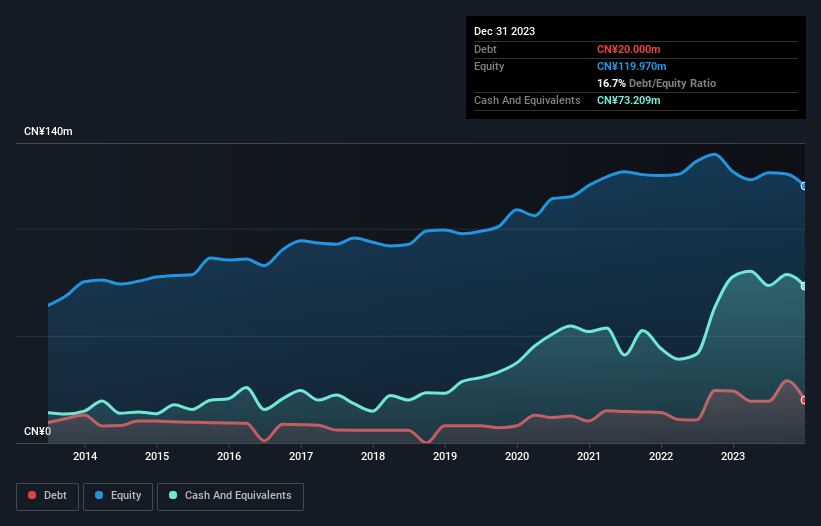David Iben put it well when he said, 'Volatility is not a risk we care about. What we care about is avoiding the permanent loss of capital.' So it might be obvious that you need to consider debt, when you think about how risky any given stock is, because too much debt can sink a company. We note that Pearl River Holdings Limited (CVE:PRH) does have debt on its balance sheet. But the real question is whether this debt is making the company risky.
When Is Debt Dangerous?
Debt assists a business until the business has trouble paying it off, either with new capital or with free cash flow. Ultimately, if the company can't fulfill its legal obligations to repay debt, shareholders could walk away with nothing. While that is not too common, we often do see indebted companies permanently diluting shareholders because lenders force them to raise capital at a distressed price. Of course, debt can be an important tool in businesses, particularly capital heavy businesses. The first step when considering a company's debt levels is to consider its cash and debt together.
Check out our latest analysis for Pearl River Holdings
How Much Debt Does Pearl River Holdings Carry?
You can click the graphic below for the historical numbers, but it shows that Pearl River Holdings had CN¥20.0m of debt in December 2023, down from CN¥24.3m, one year before. But on the other hand it also has CN¥73.2m in cash, leading to a CN¥53.2m net cash position.

How Healthy Is Pearl River Holdings' Balance Sheet?
According to the last reported balance sheet, Pearl River Holdings had liabilities of CN¥55.2m due within 12 months, and liabilities of CN¥27.1m due beyond 12 months. Offsetting this, it had CN¥73.2m in cash and CN¥52.6m in receivables that were due within 12 months. So it can boast CN¥43.5m more liquid assets than total liabilities.
This surplus strongly suggests that Pearl River Holdings has a rock-solid balance sheet (and the debt is of no concern whatsoever). Having regard to this fact, we think its balance sheet is as strong as an ox. Succinctly put, Pearl River Holdings boasts net cash, so it's fair to say it does not have a heavy debt load! The balance sheet is clearly the area to focus on when you are analysing debt. But it is Pearl River Holdings's earnings that will influence how the balance sheet holds up in the future. So if you're keen to discover more about its earnings, it might be worth checking out this graph of its long term earnings trend.
In the last year Pearl River Holdings had a loss before interest and tax, and actually shrunk its revenue by 18%, to CN¥243m. We would much prefer see growth.
So How Risky Is Pearl River Holdings?
While Pearl River Holdings lost money on an earnings before interest and tax (EBIT) level, it actually generated positive free cash flow CN¥248k. So taking that on face value, and considering the net cash situation, we don't think that the stock is too risky in the near term. There's no doubt the next few years will be crucial to how the business matures. There's no doubt that we learn most about debt from the balance sheet. However, not all investment risk resides within the balance sheet - far from it. For example - Pearl River Holdings has 3 warning signs we think you should be aware of.
If, after all that, you're more interested in a fast growing company with a rock-solid balance sheet, then check out our list of net cash growth stocks without delay.
New: Manage All Your Stock Portfolios in One Place
We've created the ultimate portfolio companion for stock investors, and it's free.
• Connect an unlimited number of Portfolios and see your total in one currency
• Be alerted to new Warning Signs or Risks via email or mobile
• Track the Fair Value of your stocks
Have feedback on this article? Concerned about the content? Get in touch with us directly. Alternatively, email editorial-team (at) simplywallst.com.
This article by Simply Wall St is general in nature. We provide commentary based on historical data and analyst forecasts only using an unbiased methodology and our articles are not intended to be financial advice. It does not constitute a recommendation to buy or sell any stock, and does not take account of your objectives, or your financial situation. We aim to bring you long-term focused analysis driven by fundamental data. Note that our analysis may not factor in the latest price-sensitive company announcements or qualitative material. Simply Wall St has no position in any stocks mentioned.
About TSXV:PRH
Pearl River Holdings
Through its subsidiaries, engages in the manufacture and distribution of plastic products in the People’s Republic of China, Australia, the United States, and internationally.
Moderate with mediocre balance sheet.
Market Insights
Community Narratives



